Book contents
- Frontmatter
- Contents
- Acknowledgments
- List of Abbreviations
- Chronology
- Introduction: Fu Ssu-nien and Post-1895 Intellectual Trends
- 1 Fu Ssu-nien's Early Years
- 2 The Shaping of a New Historical School
- 3 Toward a Theory of Plural Origins of Chinese Civilization: Hypotheses on Ancient Chinese History
- 4 Contra-Introspective Moral Philosophy
- 5 The Burden of the May Fourth Mentality
- 6 Statism and the Later Days of a May Fourth Youth
- Conclusion: The Defeat of a May Fourth Youth
- Appendix I A Fragment from a Short Story Attacking Ku Chieh-kang
- Appendix II A Transcript of a Conversation between Fu Ssu-nien and Ch'en Pu-lei
- Glossary
- Bibliography
- Index
1 - Fu Ssu-nien's Early Years
Published online by Cambridge University Press: 01 February 2010
- Frontmatter
- Contents
- Acknowledgments
- List of Abbreviations
- Chronology
- Introduction: Fu Ssu-nien and Post-1895 Intellectual Trends
- 1 Fu Ssu-nien's Early Years
- 2 The Shaping of a New Historical School
- 3 Toward a Theory of Plural Origins of Chinese Civilization: Hypotheses on Ancient Chinese History
- 4 Contra-Introspective Moral Philosophy
- 5 The Burden of the May Fourth Mentality
- 6 Statism and the Later Days of a May Fourth Youth
- Conclusion: The Defeat of a May Fourth Youth
- Appendix I A Fragment from a Short Story Attacking Ku Chieh-kang
- Appendix II A Transcript of a Conversation between Fu Ssu-nien and Ch'en Pu-lei
- Glossary
- Bibliography
- Index
Summary
Hometown: An Old Society on the Verge of Collapse
Fu Ssu-nien was born on March 26, 1896, in Liao-ch'eng, Shantung, where his ancestors had lived since the fifteenth century. From 1467 to 1487, Fu Ssu-nien's ancestor Fu Hui-tsu, a native of Kiangsi, served as magistrate of the Kuan-hsien district in western Shantung. An epitaph records that when Hui-tsu's tenure was up, the local people begged him to stay, whereupon “he had (three of) his sons remain to comfort the people.” Two of Hui-tsu's sons later moved from Kuan-hsien to the neighboring district of Liao-ch'eng. Henceforth Liao-ch'eng became the “hometown” of that branch of Fu's family, which by Fu Ssu-nien's time had lived there for fourteen generations.
The geographical setting and decline of Liao-ch'eng during the late Ch'ing exerted considerable influence on Fu's upbringing. The fate of Fu's hometown followed that of the Grand Canal and the “eight-legged essay” (pa-ku-wen). The economic importance of the Grand Canal in this area was pivotal. “Its river network stimulated trade and tied the region together, its commercial traffic was a great source of private and public wealth, and its rhythms shaped the life of millions in the counties along its banks.” Liao-ch'eng was an important harbor along the Grand Canal, and its fate hinged very much on the success of the canal. For the residents of Liao-ch'eng, this was both fortunate and unfortunate. For centuries the canal brought easy wealth to the city, making Liao-ch'eng one of four major inland harbors north of the Yangtze River.
- Type
- Chapter
- Information
- Fu Ssu-nienA Life in Chinese History and Politics, pp. 11 - 54Publisher: Cambridge University PressPrint publication year: 2000

